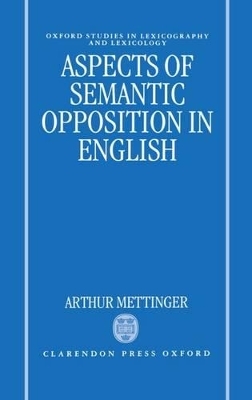
Aspects of Semantic Opposition in English
Clarendon Press (Verlag)
978-0-19-824269-7 (ISBN)
Antonymy is recongized as an important type of meaning relation in natural languages, yet there are very few detailed empirical studies of the topic. Through an analysis of a corpus of 43 contemporary English-language novels Dr Mettinger isolates ten syntactic frames within which antonyms are regularly found: these serve as a useful heuristic tool for eliciting opposites from texts. He argues that there are two kinds of antonyms: systemic opposites which have meaning relations definable in strictly semantic terms, and non-systemic opposites which require contextual and encyclopaedic knowledge for an interpretation of their relationship.
The author analyses systemic opposites within an autonomous semantics framework based on semantic field theory, using semantic features, semantic dimensions, and archisememes as descriptive tools. His analysis of 350 pairs of antonyms taken from Roget's Thesaurus of English Words and Phrases yields a typology of meaning-opposition in English based on syntacticosemantic criteria such as gradability and scalarity which stands in contrast to standard logic-based typologies. Among the specific topics covered are `negative' prefixes, the problem of markedness, and the treatment of meaning-opposition from a cognitive point of view.
Part 1 "Antonymy" - scope and delimitations: some remarks on the state of the art; semantic opposition - two "againsts"; adversivity, oppositeness of meaning and contrast. Part 2 Contrast: opposites in context - basic assumptions; opposites in context - corpus. Part 3 Semantic oppostion - systemic versus non-systemic: systemic semantic opposition; non-systemic opposition. Part 4 Oppositeness of meaning - basic assumptions: central oppositeness of meaning. Part 5 Central oppositeness of meaning - analyses: digital opposites; scalar opposites. Part 6 Central oppositeness of meaning - some further issues: oppositeness of meaning versus negation; the problem of markedness; some remaining problems. Appendices: opposites in context - index of sources; the "Roget's Thesaurus" corpus.
| Erscheint lt. Verlag | 3.2.1994 |
|---|---|
| Reihe/Serie | Oxford Studies in Lexicography and Lexicology |
| Verlagsort | Oxford |
| Sprache | englisch |
| Maße | 144 x 223 mm |
| Gewicht | 398 g |
| Themenwelt | Geisteswissenschaften ► Philosophie ► Sprachphilosophie |
| Geisteswissenschaften ► Sprach- / Literaturwissenschaft ► Sprachwissenschaft | |
| ISBN-10 | 0-19-824269-7 / 0198242697 |
| ISBN-13 | 978-0-19-824269-7 / 9780198242697 |
| Zustand | Neuware |
| Haben Sie eine Frage zum Produkt? |
aus dem Bereich


